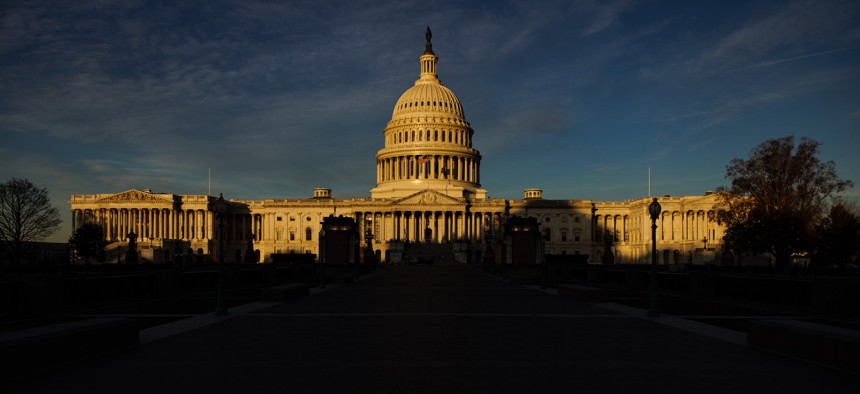Loving guns, hating the government

The rising sun creeps across the US Capitol dome on November 8, 2022 in Washington, D.C. Samuel Corum/Getty Images
In the wake of recent mass shootings, Steve Kelman explores the reasons why some are resistant to assault weapons bans and how it may stem from an aversion to the federal government.
The recent spate of unusually horrific killings – in Chesapeake, Virginia, where a Walmart store manager murdered his own employees, and in Colorado Springs, Colorado, where a gay bar was shot up – has to some extent reopened what has been the something of a closed issue, assault weapons bans.
Why are so many people so vehemently opposed to gun restrictions, even assault weapons bans? There is a plausible reason, captured in the NRA slogan, “The remedy for a bad person with a gun is a good person with a gun.” Although the claim is empirically controversial (some argue that having a gun can be very dangerous, either by falling into the hands of criminals during an attack or being discharged by mistake or carelessness), guns surely can be used for self-defense against home invaders or street attackers. And there is a less-attractive reason to have a gun growing out of what some call “toxic masculinity.”
But there is a third reason to have a gun that should be of special interest to readers of this blog. This is the view that people should be armed to be able to oppose government tyranny. After the recent shootings, I posted the question on my Facebook page asking whether there were any legitimate uses for assault rifles outside of war.
I got the following response from my friend Ed Meagher, ex-military and now a retired long-time VA employee: “I have had this discussion many, many times with gun rights, 2nd Amendment advocates over the years. They make arguments about the 2nd amendment, personal safety and the ill-defined notion of ‘freedom’ as they interpret it. However at the root of it is always the hatred for big government and in some cases government of any size. They harbor this notion that they may have to, at some point, take up their weapons and go fight government. It is an incoherent argument and when you press them they usually resort to name calling, i.e., communist, socialist and more recent Antifa and Democrat.”
Rep. Mo Brooks (R-Ala.) has stated that "the Second Amendment is designed to help ensure that we, the citizenry, always have the right to take back our government should it become dictatorial. The moment that we take from our citizenry our ability to take our government back is the moment that the ability of dictatorial forces increases to the point where perhaps they will try to implement a dictatorial government at the federal level."
The conservative radio host Erick Erickson has written that the Second Amendment “has just as much to do with the people protecting themselves from tyranny as it does burglars." UCLA constitutional law professor Adam Winkler states, "The idea that the Second Amendment protects the right to have guns to fight against the government used to be a fringe idea, just among militia groups and Second Amendment purists. But it's become much more mainstream over the last 10 years or so."
I will confess that, speaking for myself personally, I find the view that we need guns to protect ourselves against our government to be pretty close to unhinged. We live in a democratic society – if the government starts behaving badly, there are many steps short of armed revolt we can take to stop it, starting, of course, with voting against those in power. And we have strong courts to protect the minority rights in the Bill of Rights.
Well, it might be objected, even if the chances of us falling victim to a tyranny against which we need to defend ourselves are small, does arming ourselves serve as an insurance policy just in case?
The problem is that arming ourselves for defense against tyranny has costs of its own. Probably the biggest costs are paranoia and pathological suspicion in society, something we are most definitely suffering from today in the US. And if people have no trust in our leaders, they are less likely to voluntarily and willingly comply with laws and regulations, so compliance is driven only by fear, punishments and surveillance.
It is hard to do too much about the active government haters out there. But there are some things the rest of us can do. A simple one is to use the phrase “our government” rather than “the government,” to emphasize that government is not an alien appendage. And we should take as a responsibility to promote the idea that, in our country, we are in it together, with our government. This is so for all our government’s many imperfections. A long time ago, Lyndon Johnson used to say, “I’m the only president you’ve got.” This is the only government we’ve got.





